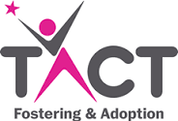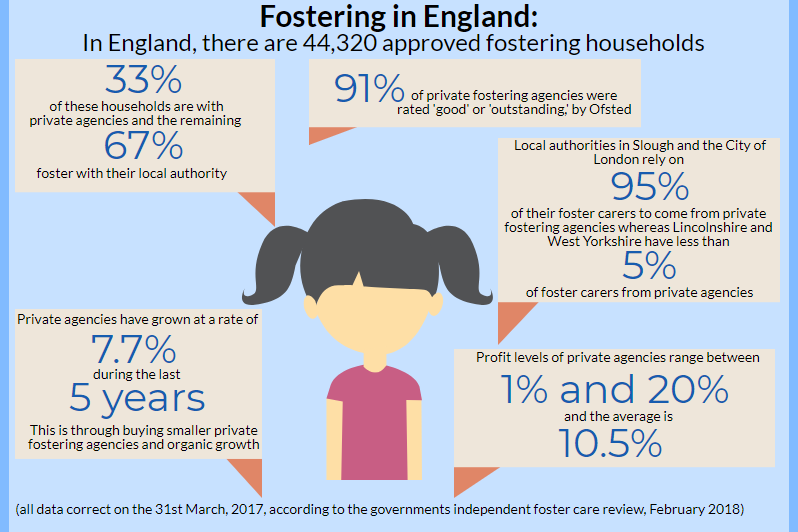 TACT Specialist Social Worker for North West Jo Culley spoke to journalism student Harriet Wallace about why are foster carers turning to private agencies. An increasing number of foster carers are now turning to private agencies, instead of local authorities, which cost the taxpayer £727 million in 2016-2017. According to the government report, commissioning placements through private agencies, “needs to vastly improve,” and if this happens, it will “improve quality” in the fostering system. The report, Foster Care in England, conducted by Sir Martin Narey, an advisor to the British government and Mark Owers, Government adviser on children in care and permanence, was a review for the Department of Education, in February 2018. During 2016-2017, local authorities spent £1.7 billion providing foster homes for over 53,000 children in the foster care system. This was 45 million pounds more than the previous years (2015-2016). £727 million of this was spent on buying placements from 295 private agencies, 235 of which were privately run and the remaining 60 from the voluntary sector. This means that 235 organisations made profit on commissioning these placements, and 60 organisations have it do it voluntarily, without making or making very little surplus. A third of foster carers come from private agencies and across the UK, 152 local authorities rely on private agencies to provide foster carers for them, as they do not have enough foster carers themselves. According to the independent review, there is a “startling failure to obtain best value” for local authorities to manage their budget better. This is down to the private agencies having the upper hand when it comes to financial negotiations, as local authorities desperately need foster carers. The independent review brought to light that foster carers from a private agency will get paid more than a foster carer who fosters through their local authority – in London, the fees and allowances for a 16-year-old foster child, means the foster carer gets £450 weekly. However, foster carers from private agencies can expect £585 a week. The report saw “virtually no evidence of discount pricing for large numbers of placements,” which can cause greater financial strain to local authorities nationwide. The independent report also found that across the nation, only three local authorities are close to becoming self-sufficient when sourcing placements for foster children – this means that the local authorities have 95% of their foster carers working for them, not private agencies. On the other hand, the report found some councils have very few foster carers working for them, or in one instance – Doncaster Council – have no foster carers at all, meaning their foster carers are all provided by private agencies. Out of 76 foster carers asked, who participated in an online survey for The Guardian, which was shared amongst a Facebook support group for foster carers, 48 of them foster through their local authority, and the remaining 28 foster carers, foster through a private agency. Only 35% of the 48 foster carers that foster through their local authority, would recommend fostering to a friend, despite 66% of them enjoying fostering. Edward Reed, a foster carer from Bradford, fostered with Bradford council, a local authority, for 14 years. He left due to not being happy with several things and he now fosters through a private agency.
Edward says his new agency “are very supportive, always email, call and see me in person. I feel valued and can focus more on the children.” Many foster carers enjoy working with the children and providing them with a safe and loving home, but do not enjoy working with the fostering system. Becky Churchyard, a foster carer, said “I feel that it is a true privilege to be part of our looked after children’s lives – watching them grow, not only physically, but emotionally too and being part of their personal processing of who they are and reassuring that it’s ok. “I do not have any faith in the system around the children and fear for the honesty and integrity of Social Workers. I feel that although the children are supposed to be at the centre of everything, they aren’t, and it is the families that are given priority, along with financial constraints and fear of litigation. “I’m also concerned at the amount of money that is made by Independent Fostering Agencies at the expense of the children and Foster Carers.” Stacey Dolan, a foster carer from Preston, says: “I love caring for the children but that is the only reason I do this – I do not enjoy the ‘fostering’ bit; it’s bureaucratic and foster carers are stuck in a blame culture which often means we are treated awfully.” Jo Culley, a Specialist Social Worker for North West at TACT, said: “Foster carers are turning to private agencies because of the lack of support they would get from local authorities. “With a private agency, you do tend to get a lot more support and visits from social workers and you also get more opportunities to access more resources. “It is such a difficult job being a foster carer sometimes, and they need the support that some local authorities just can’t give.” Most private agencies charge local authorities fees for a placement, some agencies do this to make a profit, and some do it to cover costs, such as TACT. Jo says it’s not unusual for foster carers to move on with fostering with local authorities, to private agencies, because of the lack of support local authorities give to its foster carers. Jo works for a fostering charity called TACT, otherwise known as The Adolescent and Children’s Trust. According to their website, they have been helping to provide loving families to children for over 25 years and are there 24 hours a day, seven days a week, to support their foster carers. If TACT make any surplus money made by charging local authorities fees, however small, it goes back into caring for the children and their foster carers by running events and training. This is different to most private agencies, as they would keep their profits for their company. Jo adds: “I think it’s wrong in terms of where their money goes, for example, our small surplus goes on the children in our care. “What you read and what you see is the profit private agencies make is often offset elsewhere and I don’t agree with that because we should not be profiting on vulnerable children at all.” However, Jo understands that most foster carers enjoy fostering with a private agency because they get more resources. She explains that local authorities often come under pressure with government cuts, as it means their resources become very stretched and social workers are often overworked. Jo says: “Local authorities are already on their knees and every year; the cuts keep coming. “There’s only so much money to go around every department, and although fostering is one that really needs the funding, it just does not get it. “Without funding, you can’t provide the right support and resources to foster carers.” Source: https://harrietwallace.com/ Comments are closed.
|
News & JobsNews stories and job vacancies from our member agencies, the fostering sector and the world of child protection and safeguarding as a whole. Browse Categories
All
|
|
The Fairer Fostering Partnership
c/o TACT Fostering Innovation House PO Box 137 Blyth NE24 9FJ |


 RSS Feed
RSS Feed
